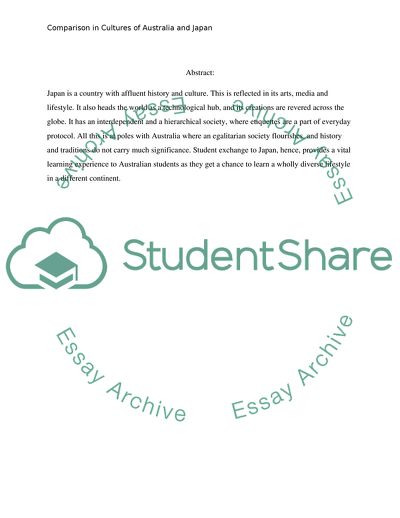Cite this document
(Comparison in Cultures of Australia and Japan Report Example | Topics and Well Written Essays - 1250 words, n.d.)
Comparison in Cultures of Australia and Japan Report Example | Topics and Well Written Essays - 1250 words. https://studentshare.org/culture/1742975-a-major-comparisons-in-key-culture-areas-between-australia-and-japan-for-a-student-exchange-program
Comparison in Cultures of Australia and Japan Report Example | Topics and Well Written Essays - 1250 words. https://studentshare.org/culture/1742975-a-major-comparisons-in-key-culture-areas-between-australia-and-japan-for-a-student-exchange-program
(Comparison in Cultures of Australia and Japan Report Example | Topics and Well Written Essays - 1250 Words)
Comparison in Cultures of Australia and Japan Report Example | Topics and Well Written Essays - 1250 Words. https://studentshare.org/culture/1742975-a-major-comparisons-in-key-culture-areas-between-australia-and-japan-for-a-student-exchange-program.
Comparison in Cultures of Australia and Japan Report Example | Topics and Well Written Essays - 1250 Words. https://studentshare.org/culture/1742975-a-major-comparisons-in-key-culture-areas-between-australia-and-japan-for-a-student-exchange-program.
“Comparison in Cultures of Australia and Japan Report Example | Topics and Well Written Essays - 1250 Words”. https://studentshare.org/culture/1742975-a-major-comparisons-in-key-culture-areas-between-australia-and-japan-for-a-student-exchange-program.


